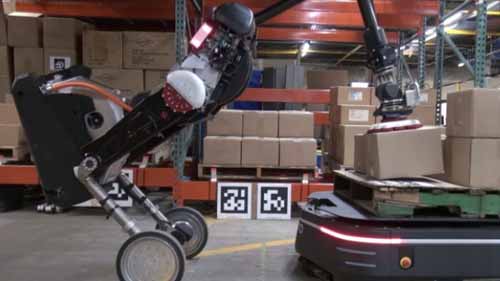
Source: Pinterest
For a long time, companies focused mainly on streamlining production lines. It is, however, becoming apparent that an efficient production line counts for little when the supply chain is inefficient. It is for this reason that most firms are keen on investing in warehouse robots.
If you are considering automating your warehouse, it might be helpful to learn how other businesses have navigated it. Better yet, it could help you decide if warehouse automation is a good fit for your facility.
So, without further ado, here are some of the industries where warehouse robots are being applied.
E-commerce
The warehouses of e-commerce retailers manage high volumes of commodities with an equally high turnover rate. For example, it is estimated that Amazon receives as many as 35 orders per second. An extrapolation of that number yields 126,000 orders per hour and over a million in a day. If you factor in surges during sales and holiday periods, the figures are jaw-dropping.
It would take thousands of employees to fulfill such orders in good time. Still, costs would be higher and delivery times would be quite long. As a result, most e-commerce retailers are taking on warehouse robots to complement the work of human laborers. Amazon was a pioneer in implementing warehouse automation but the idea has caught on to many other brands including Alibaba and Walmart.
Shipping and Logistics
Sending parcels or shipping merchandise is often an anxiety-inducing process for most people. Will your shipment arrive safe and intact? Should you anticipate delays?
The success of a logistics company hinges on how well its warehouse is run. However, most firms are faced with challenges such as:
Errors in handling packages- packages getting assigned to the wrong destinations.
Pilferage – some logistics warehouses have high theft occurrences where the merchandise being shipped is valuable.
Slow or inconsistent rate of output by human labor – employee productivity tends to decline the further they get into their shift. Moving packages across a warehouse is also exhausting and time-consuming.
To address these types of challenges, DHL has been adapting warehouse automation systems. A case in point is the company’s warehouse in Beringe, Netherlands that uses a pick and place robotic arm fitted with a scanner. It can handle up to 600 packages per hour which is a great improvement in productivity from when the operation was fully manual.
Automotive Industry
Most manufacturers in the automotive industry maintain a spare parts warehouse. Various parts are retrieved from there as the assembly of vehicles progresses. However, automotive parts are heavy and thus difficult to cart around. Productivity is also affected when employees have to interrupt their work to go and fetch parts.
Warehouse robots solve this dilemma by shuttling between the warehouse and the factory floor and delivering parts to workers. It is a more efficient system with no interruptions and staff can order parts as the need arises.
Skoda, a Czechia automobile manufacturer, has successfully implemented this kind of system in its small parts warehouse. It uses warehouse robots to retrieve and fill up crates with parts that are needed for assembly. Its robots can fill up to 580 crates in an hour.
Pharmaceutical Warehouses
Pharmaceutical products require high standards of hygiene from the production line to storage. Where cleanrooms are involved, staff have to disrobe and deliver products to the warehouse then wear protective gear again when they return to the cleanroom. This results in high use of sanitary wear which is expensive and the routine is also exhausting and time-consuming.
IP-rated warehouse robots are now being applied to address this challenge. They easily and quickly shuttle between the production cleanroom and the warehouse to deliver the pharmaceutical products. Employees no longer have to robe and disrobe or cart product loads across the facility.
Chemical Manufacturers
A lot of caution is required in the handling of chemical products as they are prone to spilling. Such occurrences are dangerous given as some chemicals are corrosive and could be harmful to warehouse staff. Besides, it would be unethical to deliver leaking batches of products to consumers.
In a bid to safeguard both staff and products, chemical manufacturers are turning to solutions like Automated Mobile Robots and robotic arms. The robotic arms pick and place the products as needed while AMRs ferry them across the warehouse. Safety, efficiency, and speed are achieved all in one system.
Conclusion
It is undeniable that warehouse robots are making a significant impact on how companies in different industries run their warehouses. When they are harnessed correctly, their benefits outweigh any cost that may be incurred to bring them on board. Suffice to say, if you partner with the right warehouse robot manufacturer, you could get your warehouse to run at efficiencies you never thought possible.
Also Read:

Painting Booth | Robotic Spraying | Auto Parts Painting

Painting Robot Price|Painting Robot Arm|Spraying Painting Robot

Painting Robot | Robotic Painting | Robot Painting Cell

